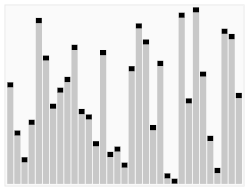
Back Rekenaarwetenskap Afrikaans Informatik ALS የኮምፒውተር፡ጥናት Amharic Informatica AN علم الحاسوب Arabic علم الكمبيوتر ARZ কম্পিউটাৰ বিজ্ঞান Assamese İnformatika Azerbaijani بیلگیسایار بیلیمی AZB Информатика Bashkir
| Computer science |
|---|
 |
Computer science is the study of computation, information, and automation.[1][2][3] Computer science spans theoretical disciplines (such as algorithms, theory of computation, and information theory) to applied disciplines (including the design and implementation of hardware and software).[4][5][6]
Algorithms and data structures are central to computer science.[7] The theory of computation concerns abstract models of computation and general classes of problems that can be solved using them. The fields of cryptography and computer security involve studying the means for secure communication and preventing security vulnerabilities. Computer graphics and computational geometry address the generation of images. Programming language theory considers different ways to describe computational processes, and database theory concerns the management of repositories of data. Human–computer interaction investigates the interfaces through which humans and computers interact, and software engineering focuses on the design and principles behind developing software. Areas such as operating systems, networks and embedded systems investigate the principles and design behind complex systems. Computer architecture describes the construction of computer components and computer-operated equipment. Artificial intelligence and machine learning aim to synthesize goal-orientated processes such as problem-solving, decision-making, environmental adaptation, planning and learning found in humans and animals. Within artificial intelligence, computer vision aims to understand and process image and video data, while natural language processing aims to understand and process textual and linguistic data.
The fundamental concern of computer science is determining what can and cannot be automated.[2][8][3][9][10] The Turing Award is generally recognized as the highest distinction in computer science.[11][12]
- ^ "What is Computer Science?". Department of Computer Science, University of York. Archived from the original on June 11, 2020. Retrieved June 11, 2020.
- ^ a b What Can Be Automated? Computer Science and Engineering Research Study. Computer Science Series. MIT Press. 1980. ISBN 978-0262010603. Archived from the original on January 9, 2021.
- ^ a b Denning, P.J.; Comer, D.E.; Gries, D.; Mulder, M.C.; Tucker, A.; Turner, A.J.; Young, P.R. (February 1989). "Computing as a discipline". Computer. 22 (2): 63–70. doi:10.1109/2.19833. ISSN 1558-0814. Archived from the original on March 3, 2022. Retrieved March 3, 2022.
The discipline of computing is the systematic study of algorithmic processes that describe and transform information, their theory, analysis, design, efficiency, implementation, and application. The fundamental question underlying all of computing is, 'What can be (efficiently) automated?'
- ^ "WordNet Search—3.1". WordNet Search. Wordnetweb.princeton.edu. Archived from the original on October 18, 2017. Retrieved May 14, 2012.
- ^ "Definition of computer science | Dictionary.com". www.dictionary.com. Archived from the original on June 11, 2020. Retrieved June 11, 2020.
- ^ "What is Computer Science? | Undergraduate Computer Science at UMD". undergrad.cs.umd.edu. Archived from the original on November 27, 2020. Retrieved July 15, 2022.
- ^ Harel, David (2014). Algorithmics The Spirit of Computing. Springer Berlin. ISBN 978-3-642-44135-6. OCLC 876384882. Archived from the original on June 17, 2020. Retrieved June 17, 2020.
- ^ Patton, Richard D.; Patton, Peter C. (2009), Nof, Shimon Y. (ed.), "What Can be Automated? What Cannot be Automated?", Springer Handbook of Automation, Springer Handbooks, Berlin, Heidelberg: Springer, pp. 305–313, doi:10.1007/978-3-540-78831-7_18, ISBN 978-3-540-78831-7, archived from the original on January 11, 2023, retrieved March 3, 2022
- ^ Forsythe, George (August 5–10, 1969). "Computer Science and Education". Proceedings of IFIP Congress 1968.
The question 'What can be automated?' is one of the most inspiring philosophical and practical questions of contemporary civilization.
- ^ Knuth, Donald E. (August 1, 1972). "George Forsythe and the development of computer science". Communications of the ACM. 15 (8): 721–726. doi:10.1145/361532.361538. ISSN 0001-0782. S2CID 12512057.
- ^ Hanson, Vicki L. (January 23, 2017). "Celebrating 50 years of the Turing award". Communications of the ACM. 60 (2): 5. doi:10.1145/3033604. ISSN 0001-0782. S2CID 29984960.
- ^ Scott, Eric; Martins, Marcella Scoczynski Ribeiro; Yafrani, Mohamed El; Volz, Vanessa; Wilson, Dennis G (June 5, 2018). "ACM marks 50 years of the ACM A.M. turing award and computing's greatest achievements". ACM SIGEVOlution. 10 (3): 9–11. doi:10.1145/3231560.3231563. ISSN 1931-8499. S2CID 47021559.



